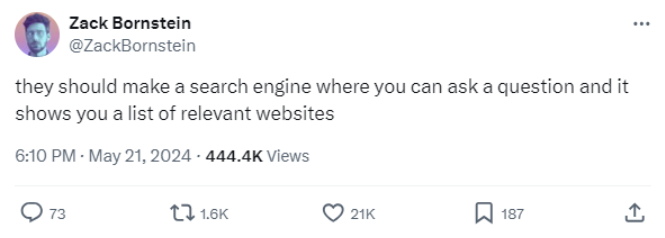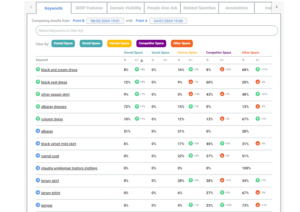Search Engine Journal’s article “Meet the 7 most popular search engines in the world” puts Google at number 1 with over 81.74% of the search market share. It’s a highly trusted brand for search, and getting featured on Google page one is what drives the SEO industry.
As you’re no doubt aware, at its annual Google I/O conference, Google announced plans to incorporate generative AI directly into Google search. AI overviews generate quick answers, using Gemini (their largest and most capable AI model) to piece together information from various sources.
Google SGE is different to their traditional search engine. You’ll be able to ask complex questions and receive detailed answers. Results will be generated through Gemini but Gemini will be gathering its content from sources across the internet.
Significantly, AI overviews will dominate the space on page one SERPs and traditional results may be buried down the page. The question remains though… is this what users want? .

It’s certainly not what content creators want. SGE is likely to result in a loss of traffic to their site.. And many users are frustrated that they cannot easily opt out of SGE results. Many users have spoken out about how at least Bing gives you the option to turn AI results off.
The Trust Deficit
Since its launch, Google’s SGE has been ridiculed on social media. For a brand that was trusted to deliver accurate search results, to now be presenting results suggested you glue cheese to a pizza… well, that’s got to be damaging. Some of the answers that Google is presenting might even be coming from other posts that were quoting faulty ChatGPT responses! Is this where we’re going to end up? With generative engines quoting each other’s faulty responses and generating even more nonsense?
The shift for Google to go from an extremely trusted search engine to a potentially unreliable one might have an impact on user loyalty. For advertisers, Google has stated that search ads will continue to appear in dedicated ad slots throughout the page, but not everyone wants to or can afford to invest in search ads and many have found success through organic results… what happens to that? It certainly would seem there will be a reduction in visibility and click through rates for brands who’ve heavily invested in SEO efforts.
Marketers and SEO professionals will be carefully watching the roll-out of SGE and be making plans to adapt to the changing search landscape. Search Engine Journal’s article on “How to adapt SEO strategies to SGE” provides useful tips to ensure you’re ready. We’re particularly interested in the second point which is the suggestion of moving SEO focus from keyword ranking to holistic organic SERP visibility. This is exactly what SERPsketch has been focused on since its conception. Focusing on brand appearance, content and features rather than link positioning might help brands counter any effects of SGE.




